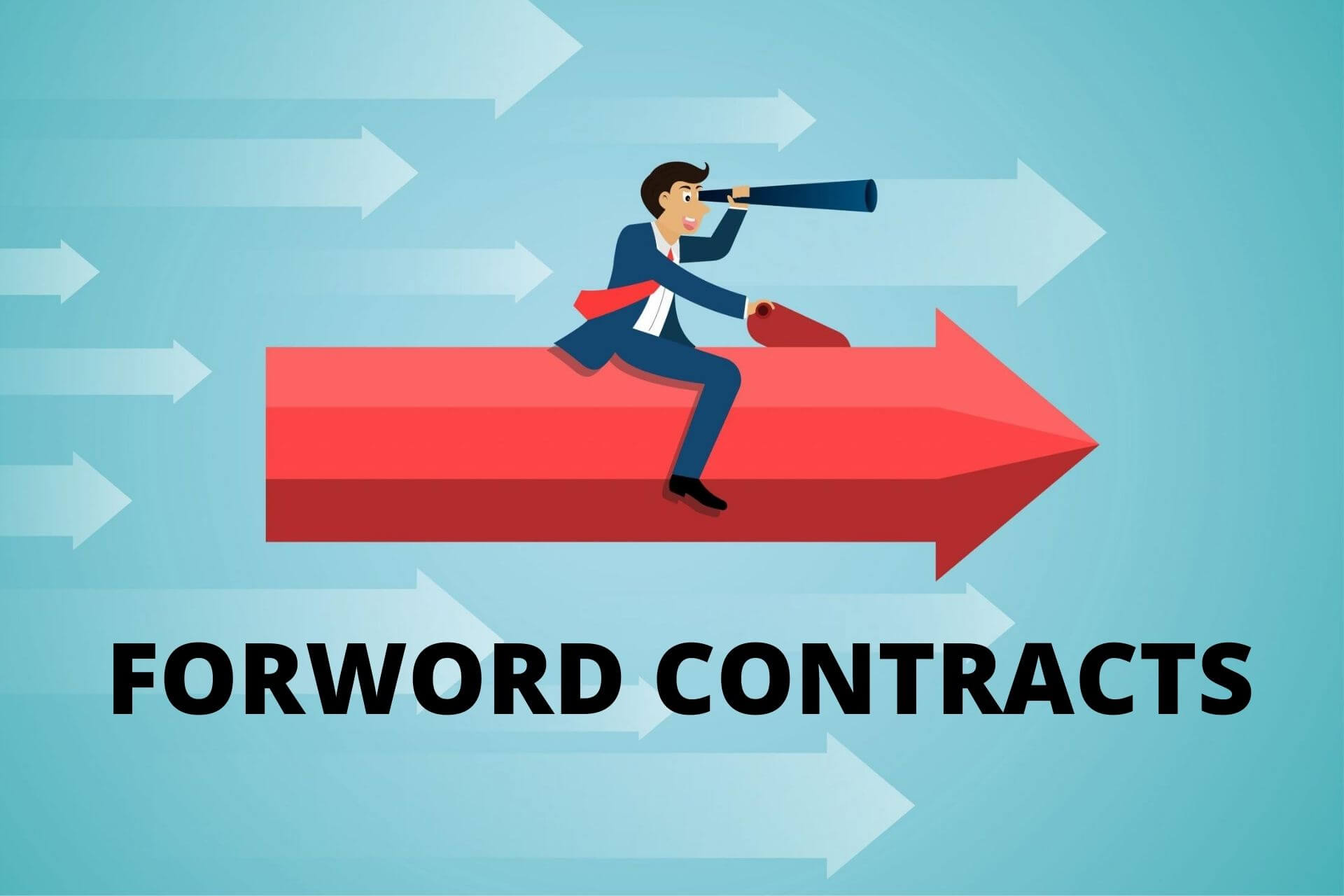Understanding what are Forward Contracts along with its risks and outcomes: One of the most important key concepts to understand for a derivate trader is forward contracts. Through this article, we aim to give a clear understanding of the Forward Market and Forward contract.
Today, we’ll cover what are forward contracts. We’ll also look into why do both the parties enter into the contract, possible outcomes, how they are settled, risks associated, and more. Let’s get started.
Table of Contents
What are Forward Contracts?
The Forward contract, as the name suggests, is a financial derivative transaction that is settled at a specified date in the ‘future’. The forward contract derives its value from the value of the underlying asset. Therefore, in that regard, the futures and forward contracts have a lot of similarities.
The forward contract can be said to be the more ancient version of the futures contract. The basic framework of the futures contract is very similar to a forward contract. The forward contracts are still used, however, the scale and volume are very limited.
— Understanding Forward Contracts with an Example
Let us understand this concept further with the help of a simple example. Suppose, there are two parties involved. One is the manufacturer and designer of Silver jewelry. Let us call the manufacturer as “ABC Jewelers”. The other party involved is the importer of silver and he sells in bulk to jewelry shops. Let us call him “XYZ Dealer”.
Say, on 5th Aug 2020, the current price of 1 kg of silver is Rs. 65,000. ABC enters into an agreement to buy 50 kg of silver two months down the line. The agreed-upon price is the price of silver on 5th Aug 2020. Therefore, ABC has to pay Rs. 32,50,000 (65000*50) to XYX to buy 50 kg of silver on 5th Oct 2020.
In short, after two months, both the parties in the contract will have to honor their agreement irrespective of the price of silver at that time.
— Why both parties enter into the contract?
From the above context, the buyer of the silver (ABC) is of the view that the price will go up in the future and wants to lock in the prices to benefit from the increased price in the future. On the other hand, the seller of the silver (XYZ) is of the view that the price is most likely going to decline in the future and wants to benefit from the locked-in current price.
Both the parties involved in this transaction have opposing views and hence they enter into a forward contract to express their views.
— The possible outcomes of the Forward contract
Scenario 1: Either the silver price goes up
If the price of the silver goes up in the future, then ABC Jewelers stands to make a profit, and XYZ dealer is dealt loses. Say, if the price of silver goes up to Rs. 70,000 per kg after two months. So, the profit of ABC in this case will be = (70000-65000)*50 = Rs. 2,50,000. And the same is the loss for XYZ dealers.
Scenario 2: Either the silver price goes down
If the price of silver falls in the future, the XYZ dealers stand to make a profit, and ABC jewelers stand to make losses. For example, if the price of silver after 2 months falls down to Rs. 61,000 after two months. Here, the profit for XYZ dealers, in that case, will be = (65000-61000)*50 = Rs. 2,00,000. And, this will be the loss for ABC jewelers.
Scenario 3: If the price of silver remains unchanged
In that case, neither of the party (ABC or XYZ) will stand to lose or make any money from this contract.
How are forward contracts settled?
Forward contracts are settled via two ways, either cash-settled or the underlying asset is physically delivered.
1) Physical Settlement: Here, ABC jewelers pay XYZ dealers, the full agreed-upon amount (Rs. 32,50,000) of buying 50 kg of silver and in return gets the physical delivery of silver.
2) Cash Settlement: In this case, there is no actual physical delivery of silver. Just the cash differential has to be paid. Say, if the price of silver goes up, then XYZ dealers will have to give the cash differential to ABC jewelers. And if the price of silver goes down then XYZ dealers receive cash differential from ABC jewelers.
Assume, if the price of silver goes up to Rs. 67500 per kg. Then, XYZ dealer pays Rs. 1,25,000 ((67500-65000)*50) to ABC Jewelers for cash settlement.
Risks Associated while Trading Forward Contracts
Following are some of the risks associated with trading Forward contracts
- Liquidity Risk: Theoretically, the parties with opposing views enter into a forward transaction. But, in reality, it is difficult to find two parties having an opposing view and willing to enter into the forward transaction. Therefore, the parties involved will have to approach the investment bank and who in turn scouts for willful parties willing to enter the forward contract.
- Cost: The cost is a big factor in the forward contract. As the investment banks are involved in finding parties to enter into a forward contract, they come at a cost i.e., fee. Therefore, even if the price goes in favor of one of the parties, they make real profit only after the cost (fee to investment bank) is recovered.
- Default Risk: The default risk is very much if losing party upon the expiry does not pay up the other party i.e., it defaults.
- Regulation Risk: There is no regulatory framework while dealing with a forward contract. They are entered into with the mutual consent of the willing parties. Therefore, there is a situation of lawlessness and which is where the chances of default also increase.
- Non Exit able before expiry: Say, halfway through the contact, if the view of one of the party reverses, then there is no way to exit the contract before expiry. There is no clause of foreclosure. The only option which they have is to enter into another agreement which again is a tedious and cost consuming process.
Also read- Options Trading 101: The Big Cat of Trading World
Conclusion
In this article, we tried to cover what are future contracts and how future market actually works in terms of transactions and settlement. Let us quickly conclude what we discussed here:
- The basic premise while trading both forward and futures contracts are the same.
- The forward contracts are contracts that are settled at a future date.
- They are not traded via an exchange. The forward contracts are Over the counter – OTC derivative.
- The forward contracts are non exit-able before the expiry.
- These contracts can be either physically delivered or it can be cash-settled.
That’s all for this post. I hope it was useful to you. If you still have any queries related to future contracts, feel free to comment below. I’ll be happy to help. Happy trading and investing.

Hitesh Singhi is an active derivative trader with over +10 years of experience of trading in Futures and Options in Indian Equity market and International energy products like Brent Crude, WTI Crude, RBOB, Gasoline etc. He has traded on BSE, NSE, ICE Exchange & NYMEX Exchange. By qualification, Hitesh has a graduate degree in Business Management and an MBA in Finance. Connect with Hitesh over Twitter here!





